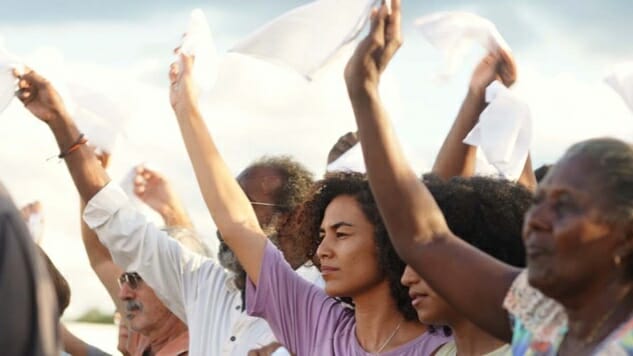A Neo-Colonial Horror Story Meets a Liberationist Tale of Revenge in Bacurau

Brazilian directors Kleber Mendonça Filho and Juliano Dornelle’s Bacurau begins with a woman named Teresa (Bárbara Colen) being driven down a winding mountain road with sweeping swathes of lush greenery below. Suddenly, a splintered wooden casket appears in the middle of the asphalt. After the driver swerves to avoid it, there is another one. And another. Soon, broken caskets litter the entire road. The cause of the coffin calamity is revealed when Teresa sees that an open-back truck transporting caskets has collided into the mountainside, killing its passengers. The scene is oddly pleasant, though, as opportunists have quickly begun selling off the least damaged goods to a line of passersby, both seeming giddy about the exchange. Death is pervasive in the film, but it is often funny.
Coincidentally, Teresa is on her way to a funeral. Her grandmother—the beloved matriarch of Bacurau, a small Brazilian village where she grew up—has died. The entire town mourns her death, oblivious to the fact that their little village is slowly, literally, being erased from the face of the earth.
Here, what has seemed like a horror film morphs into a weird Western that incorporates psychoactive flora, a seemingly benign history museum, and even an apparition or two. That’s not even counting the UFO.
Though the film might come off as ridiculous, its absurdity is hardly impossible. Bacurau presents a dystopian vision of Brazilian atrocities to come, taking place “a few years in the future,” with explicit implications of what far-right president Jair Bolsonaro might reap from the most vulnerable populations of the country. Bacurau becomes an inspiring, raucously funny tale of class vengeance that’s totally satisfying.
-

-

-

-

-

- Curated Home Page Articles By Test Admin October 21, 2025 | 3:10pm
-

- Curated Home Page Articles By Test Admin October 21, 2025 | 2:57pm
- Urls By Test Admin October 21, 2025 | 2:57pm
- Curated Home Page Articles By Test Admin October 21, 2025 | 2:55pm
-

-

-

-

-

-

-

-

-

-

-

-

-

-

-

-

-

-

-

-

-

-

-

-

-

-

-

-

-

-




































